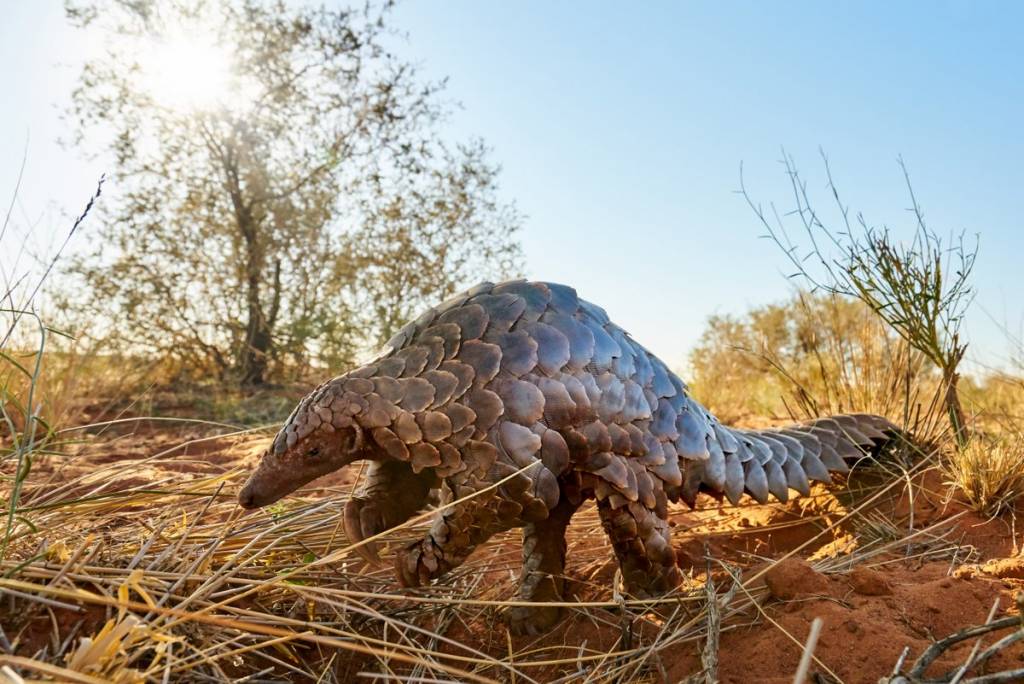“I’d like to see a pangolin…” – a phrase that strikes fear into the heart of even the most seasoned safari guide. Notoriously shy and elusive, to spot a pangolin in the wild is considered the holy grail of safari sightings where ever they occur. In this month’s newsletter, we feature this endearing creature which sadly, currently carries the title of the world’s most trafficked mammal.
What is a Pangolin?
There are eight species of pangolin worldwide, all threatened with extinction, and half of them live in Africa. In South Africa, we are lucky to have the Temminck’s ground pangolin (Smutsia temminckii), one of the larger species found on the continent. Affectionately known as the ‘great gardeners of the Earth’, this almost other-worldly looking creature plays a vital role in maintaining the delicate balance of the ecosystem. Pangolins, being a keystone species, keep the numbers of other species in check. Case in point are termites, a preferred food source of ground pangolins. Eliminate pangolins from the equation and the effect of an exploding population of termites would have a very negative knock-on effect to the environment. Although they look much like scaly armadillos, they are more closely related to bears and dogs and constitute their own taxonomic order.
Tipping the scales
With four of the eight species of Pangolin occurring in Asia and the population decimated by insatiable demand, the market has now shifted its focus to Africa. The effect is devastating. These mammals have scant protection against the humans hunting them; their overlapping, impenetrable scales offer adequate protection from natural predators such as lion but sadly do nothing to protect them against human poachers. When threatened, pangolins roll into a ball (a very stressful exercise for them) and stay that way until they perceive the threat to have passed. Sadly these gentle creatures are easily picked up when in this defensive state, and carried off to their unnatural end – either the bushmeat trade or the medicinal markets of Asia. Their meat is regarded as a delicacy and much like Rhino horn their scales are revered in Asian traditional medicine. Pangolins are protected by both national law in the countries that they occur and by a ban on international commercial trade. In 2019 a shipment of over 14 tons (an estimated 36 000 pangolins) was seized in Nigera. Although law enforcement is promising, most of the trade goes undetected.
Experience conservation in action
Thanks to those who recognise the importance of this keystone species, all is not lost. In South Africa, andBeyond Phinda Private Reserve and Tswalu Kalahari Private Reserve have both galvanised conservation efforts to benefit the pangolins in Africa, dedicating much-needed resources of research and funding through ecotourism initiatives.
Phinda Private Game Reserve, on Kwa-Zulu Natal’s North coast, has recently partnered with the African Pangolin Working Group to reintroduce Temminck’s ground pangolin where the species has for some time been locally extinct. These pangolin have been retrieved from poachers and rehabilitated. Our guests are able to contribute to this important project by participating in the “Pangolin Conservation Experience” with our friend and conservationist Simon Naylor, reintroducing pangolins back to where they rightfully belong, helping to reverse the local extinction at Phinda. The reserve has 24 hour anti-poaching surveillance making it a safe haven for these pangolins that have been given a second chance.
At Tswalu Private Game Reserve our guests are able to connect with Wendy Panaino and learn about her important research which involves tracking and monitoring pangolin, this is of course done with extreme respect and in this way many of our guests have viewed pangolin foraging and going about their lives freely.
Talk to us to learn more about the plight of the pangolin and what some of our partners in tourism are doing to save them from extinction. If you wish to visit properties making an invaluable contribution to the success of this unique species (and with this, increase the odds of spotting them in the wild), reach out to us here.
Warm regards from Simon, Jen and the Bellingham team.
FEATURED LODGES

The much beloved Tswalu Motse reopened in June this year after an extensive renovation. Tswalu has always been primarily focused on land restoration and conservation and remains honest, authentic and inspirational. The revamp is fittingly unpretentious with a focus on simplicity and comfort.

Phinda has six lodges to choose from, but as “the old dame” has had a recent facelift and is looking gorgeous we thought it only fair to feature Mountain Lodge. Family cottages and a family suite make this perfect for family travel.

